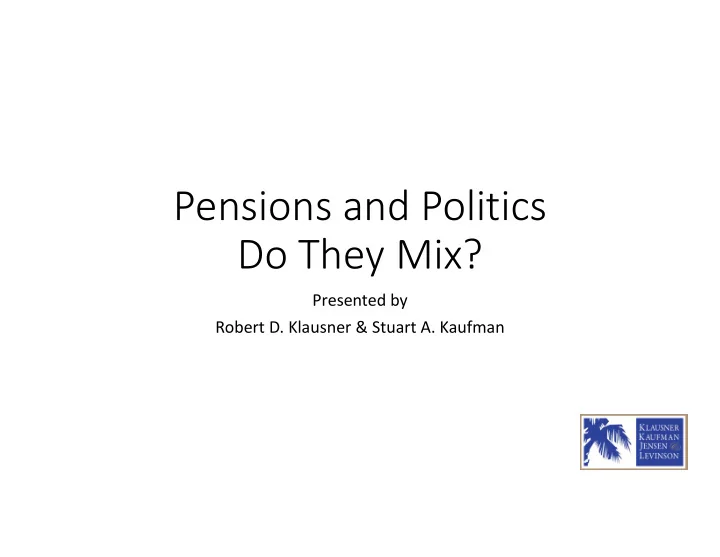

Pensions and Politics Do They Mix? Presented by Robert D. Klausner & Stuart A. Kaufman
The Fiduciary Creed • A fiduciary shall discharge his or her duties with respect to a plan solely in the interest of the participants and beneficiaries for the exclusive purpose of providing benefits to participants and their beneficiaries and defraying reasonable expenses of the plan – Section 112.656(1), Fla. Stat. • Investments shall be made using the care, skill, prudence and diligence that a prudent person acting in a like capacity and familiar with such matters would use in the conduct of an enterprise of a like character and with like aims – Section 112.661, Fla. Stat.
Divestment – Prudent or Political? • The leading case remains Board of Trustees v. Mayor and City Council , 562 A.2d 720 (Md. 1989). The trustees of the City pension fund sued to challenge ordinances requiring divestiture of companies doing business in South Africa. In upholding the ordinances the Court observed that given “vast power that pension funds exert in American society, it would be unwise to bar trustees from considering the social consequences of investment decisions,” where the cost was de minimis. • The Florida Attorney General opined that a decision by the State Board of Investment (which acts as the fiduciary for the Florida Retirement System) could not adopt a rule on divestiture based on ethical considerations in the absence of enabling legislation.
ESG & Mission Investing – Are They Kosher? • Environmental, Social and Governance (ESG) ‐ Incorporates these issues into the investment decision making the process as a means to enhance returns and reduce risk. It may be argued that these are qualitatively different from divestment, because they directly involve the “G” in ESG by promoting better governance through shareholder engagement on multiple fronts. • Mission Related Investing is a more focused type of ESG and is closely aligned with the mission of the organization. For example, one large church pension plan will not invest in stocks relating to gambling, firearms, alcohol, or private prisons.
What is the Cost? • The Maryland Court in the Baltimore case found the loss from divestment was 3 basis points and an on ‐ going loss of 2 basis points and held that was de minimis • De minimis non curat lex ‐ “The law does not concern itself with trifles. ” • California’s Public Employee Retirement Systems has divested tobacco, thermal coal, firearms, and other industries with an $8B effect. • How should de minimis be measured?
What Do Courts Say About Non ‐ ERISA Plans • I]t has become generally accepted that ERISA ‐ governed asset management may not be based on social investing. ERISA fiduciaries correctly understand that insofar as social investing is concerned, they do not have the same investment prerogatives as fiduciaries of state and local pension plans , church plans, and other programs not subject to ERISA....The risk ‐ averse fiduciary will avoid activity that could be construed as symptomatic of nonfinancial motives, such as social investing. The investment decisions of risk ‐ averse fiduciaries should be based exclusively on economic merit. (emphasis added) • Medina v. Catholic Health Initiatives, 147 F.Supp.3d 1190 (D.Colo. 2015)
How Would You Answer this Question? The System’s financial advisors propose to the Board that despite an earlier decision to divest, that a return to ownership of firearms manufacturers, even those manufacturing assault weapons, should be considered. Financial analysis shows that the System will lose a material sum of investment opportunity in the manufacturing sector of its equity portfolio by not exercising this opportunity. How does the Board approach this issue?
Or This Question? The System has made a series of divestments based on various statutory mandates. Taken in isolation, each individual decision to divest has been deemed to have a de minimis effect and that other investment options are available to replace the divested companies. At what point does the Board determine that the sum of the individual decisions is no longer de minimis?
Recommend
More recommend